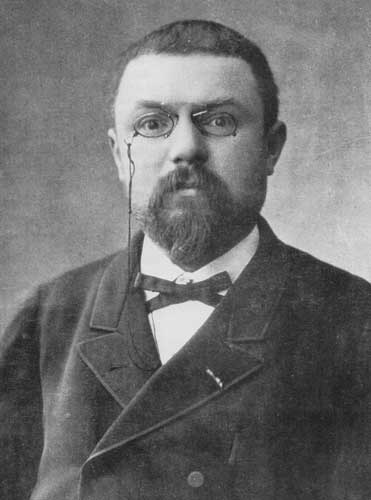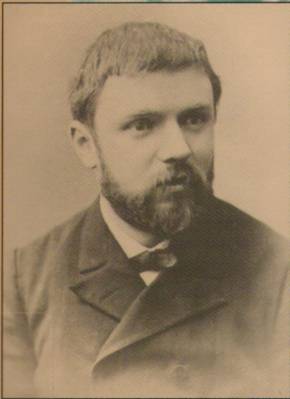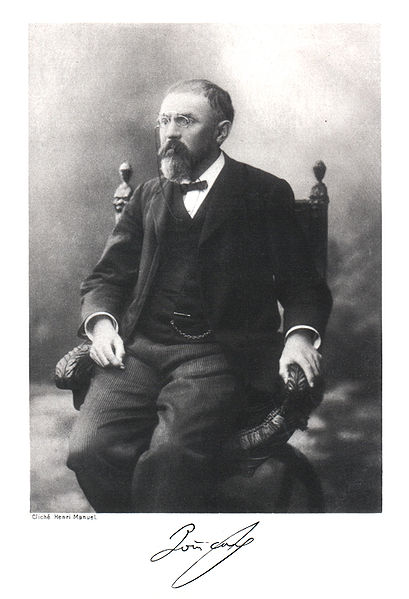<Back to Index>
- Mathematician and Physicist Jules Henri Poincaré, 1854
- Poet Constantine P. Kavafis, 1863
- Czar of the Russian Empire Alexander II Nikolaevich, 1818



Jules Henri Poincaré (29 April 1854 – 17 July 1912) was a French mathematician, theoretical physicist, and a philosopher of science. Poincaré is often described as a polymath, and in mathematics as The Last Universalist, since he excelled in all fields of the discipline as it existed during his lifetime.
As a mathematician and physicist, he made many original fundamental contributions to pure and applied mathematics, mathematical physics, and celestial mechanics. He was responsible for formulating the Poincaré conjecture, one of the most famous problems in mathematics. In his research on the three-body problem, Poincaré became the first person to discover a chaotic deterministic system which laid the foundations of modern chaos theory. He is considered to be one of the founders of the field of topology. Poincaré introduced the modern principle of relativity and was the first to present the Lorentz transformations in their modern symmetrical form. Poincaré discovered the remaining relativistic velocity transformations and recorded them in a letter to Lorentz in 1905. Thus he obtained perfect invariance of all of Maxwell's equations, an important step in the formulation of the theory of special relativity. The Poincaré group used in physics and mathematics was named after him.
Poincaré was born on 29 April 1854 in Cité Ducale neighborhood, Nancy, Meurthe-et-Moselle into an influential family. His father Leon Poincaré (1828–1892) was a professor of medicine at the University of Nancy. His adored younger sister Aline married the spiritual philosopher Emile Boutroux. Another notable member of Jules' family was his cousin, Raymond Poincaré, who would become the President of France, 1913 to 1920, and a fellow member of the Académie Française. During his childhood he was seriously ill for a time with diphtheria and received special instruction from his mother, Eugénie Launois (1830–1897). In
1862 Henri entered the Lycée in Nancy (now renamed the
Lycée Henri Poincaré in his honour, along with the
University of Nancy). He spent eleven years at the Lycée and
during this time he proved to be one of the top students in every topic
he studied. He excelled in written composition. His mathematics teacher
described him as a "monster of mathematics" and he won first prizes in
the concours général,
a competition between the top pupils from all the Lycées across
France. His poorest subjects were music and physical education, where
he was described as "average at best". However,
poor eyesight and a tendency towards absent mindedness may explain these
difficulties. He graduated from the Lycée in 1871
with a Bachelor's degree in letters and sciences. During the Franco-Prussian War of 1870 he served alongside his father in the Ambulance Corps. Poincaré entered the École Polytechnique in 1873. There he studied mathematics as a student of Charles Hermite, continuing to excel and publishing his first paper (Démonstration nouvelle des propriétés de l'indicatrice d'une surface) in 1874. He graduated in 1875 or 1876. He went on to study at the École des Mines,
continuing to study mathematics in addition to the mining engineering
syllabus and received the degree of ordinary engineer in March 1879. As a graduate of the École des Mines he joined the Corps des Mines as an inspector for the Vesoul region in northeast France. He was on the scene of a mining disaster at Magny in
August 1879 in which 18 miners died. He carried out the official
investigation into the accident in a characteristically thorough and
humane way. At the same time, Poincaré was preparing for his
doctorate in sciences in mathematics under the supervision of Charles Hermite. His doctoral thesis was in the field of differential equations. It was named Sur les propriétés des fonctions définies par les équations différences.
Poincaré devised a new way of studying the properties of these
equations. He not only faced the question of determining the integral
of such equations, but also was the first person to study their general
geometric properties. He realised that they could be used to model the
behaviour of multiple bodies in free motion within the solar system. Poincaré graduated from the University of Paris in 1879. Soon after, he was offered a post as junior lecturer in mathematics at Caen University,
but he never fully abandoned his mining career to mathematics. He
worked at the Ministry of Public Services as an engineer in charge of
northern railway development from 1881 to 1885. He eventually became
chief engineer of the Corps de Mines in 1893 and inspector general in
1910. Beginning in 1881 and for the rest of his career, he taught at the University of Paris (the Sorbonne). He was initially appointed as the maître de conférences d'analyse (associate
professor of analysis). Eventually, he held the chairs
of Physical and Experimental Mechanics, Mathematical Physics and Theory
of Probability, and Celestial Mechanics and Astronomy. Also
in that same year, Poincaré married Miss Poulain d'Andecy.
Together they had four children: Jeanne (born 1887), Yvonne (born
1889), Henriette (born 1891), and Léon (born 1893). In 1887, at the young age of 32, Poincaré was elected to the French Academy of Sciences. He became its president in 1906, and was elected to the Académie Française in 1909. In 1887 he won Oscar II, King of Sweden's mathematical competition for a resolution of the three-body problem concerning the free motion of multiple orbiting bodies. In 1893 Poincaré joined the French Bureau des Longitudes,
which engaged him in the synchronisation of time around the world. In
1897 Poincaré backed an unsuccessful proposal for the
decimalisation of circular measure, and hence time and longitude. It was this post which led him to consider the question
of establishing international time zones and the synchronisation of
time between bodies in relative motion. In the year 1899, and again more successfully in 1904, he intervened in the trials of Alfred Dreyfus.
He attacked the spurious scientific claims of some of the evidence
brought against Dreyfus, who was a Jewish officer in the French army
charged with treason by anti-Semitic colleagues. In 1912 Poincaré underwent surgery for a prostate problem and subsequently died from an embolism on 17 July 1912, in Paris. He was 58 years of age. He is buried in the Poincaré family vault in the Cemetery of Montparnasse, Paris. A former French Minister of Education, Claude Allègre, has recently (2004) proposed that Poincaré be reburied in the Panthéon in Paris, which is reserved for French citizens only of the highest honour.